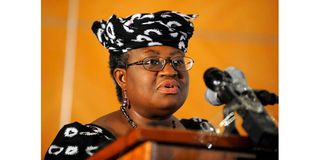How Ngozi Okonjo-Iweala rescued Nigeria

Dr Ngozi Okonjo-Iweala - she wrote Fighting Corruption is Dangerous to apportion readers with endowed comprehension, self-introspection and nourished lessons on battling graft.
What you need to know:
- Dr Ngozi wrote Fighting Corruption is Dangerous to apportion readers with endowed comprehension, self-introspection and nourished lessons on battling graft.
- Her excellence inspired administrative women to dauntlessly embark on an integrity acceleration, to surmount malpractice.
Dr Ngozi Okonjo-Iweala is the inaugural African and maiden woman to serve as Director-General of the World Trade Organization (WTO). She also presides on the boards of Standard Chartered Bank, Twitter, African Risk Capacity and Global Alliance for Vaccines and Immunisation.
She has a mental inventory of an Ivy League qualification and an unrivalled meritorious experience. She is an economics graduate of Harvard University and an accredited Massachusetts Institute of Technology PhD licensee.
Dr Ngozi wrote Fighting Corruption is Dangerous to apportion readers with endowed comprehension, self-introspection and nourished lessons on battling graft. It denotes how to obliterate and exterminate corruption, and enshrine transparency in your occupation.
Olesegun Obasanjo
She is an Igbo, from Nigerian town of Ogwashi-Ukwu in Delta State. She's a dignified pristine perfectionist and an ingenious perennial maverick who has served as a World Bank Managing Director of Operations in Washington DC. In the year 2000, she was Economic Adviser to Nigerian President Olesegun Obasanjo and Foreign Minister under Obasanjo in his second term.
She also served as the Nigerian Finance Minister under Obasanjo from 2003, before resigning in 2006. "No Nigerian minister resigns, they are only fired," she expounds. "Stepping down earned me the ire of those at the top."
In 2008, then Nigerian President Umaru Yar'Adua requested, twice, for her return to the finance ministry. She benevolently declined, having freshly warranted her World Bank vocation a few months prior.
President Yar'Adua died in 2010. Goodluck Jonathan won the subsequent presidential election and persuaded Dr Ngozi to resign from World Bank and reacquaint the Finance Ministry, due to the economic turmoil Nigeria was withstanding. Dr Ngozi commenced her second Finance ministry tenure on August 17, 2011.
Her precautionary hesitation to resuming duty at the ministry rose from her experience of the excruciating perplexity of managing the office. Finance ministers, especially from developing countries, superintend a risky job and seldom protest. They frequently repudiate colleagues, duplicitous cabinet members, civil servants, politicians and even their boss, the president or prime minister.

The book denotes how to obliterate and exterminate corruption, and enshrine transparency in your occupation.
They are under constant pressure and are loathed, vilified and ostracised, making their stay in the office short. The global average tenure for a Finance Minister is two years. Dr Ngozi administered three years in her penultimate stint under President Obasanjo and consummated the four years of her second tenure, under President Jonathan.
"Seven very tough years," she reiterates. "From the attempts to kill me, force me to resign and leave the country, which I resisted. To the false accusations in the press of mismanagement and siphoning of monies."
December 9, 2012, was the most terrifying day in Dr Ngozi's life. Her 83-year-old mother, Kamene Okonjo, was kidnapped in her home in Ogwashi-Ukwu. The kidnappers' ransom demand wasn't money. Dr Ngozi was blackmailed to appear on live television and announce her resignation from the Finance ministry.
With President Jonathan's backing, Dr Ngozi had earlier convened a forensic task force and ad-hoc committee to audit the fiscal accounts of a subset of Nigeria's fraudulent oil marketers, she had refused to pay.
Revenue leakage
She had decommissioned beneficiaries of ghostly pension payments. She also ethically resisted paying antagonising debt scammers and oil importers, who were claiming subsidies for shipments of oil never delivered. She further conscripted emerging reforms in Nigerian ports and customs facilities. These implementations petrified transgressors.
Fortuitously, within a week, her mother was released without impairment in the abduction, which was covered broadly by the BBC and CNN. Ngozi further plugged revenue leakage, revitalised financial management and obviated red-tape bureaucracy.
With the assistance of World Bank, United Kingdom's Department for International Development (DFID) and USAid, she precipitated institutional systems to stem graft.
She modernised the Nigerian payment system, created an electronic platform called the Government Integrated Financial Management Information System (GIFMIS) and the Treasury Single Account. She meticulously phased out petroleum subsidies that were crippling the economy of $11.2 billion annually.
These confluence of accounting affirmations resulted to Nigeria's gross domestic product escalating to $400 billion, transcending South Africa's, which was at $317 billion.
Dr Ngozi's excellence inspired administrative women to dauntlessly embark on an integrity acceleration, to surmount malpractice.
Jeff Anthony is a novelist, a Big Brother Africa 2 Kenyan representative and founder of Jeff's Fitness Centre @jeffbigbrother





